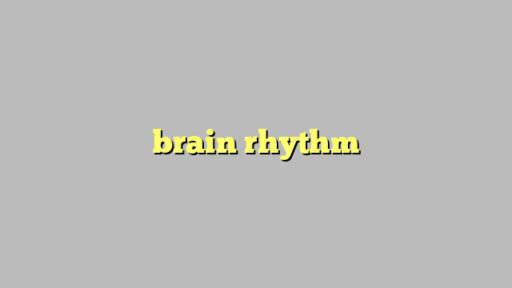Have you ever wondered how your brain is able to process information, make decisions, and regulate bodily functions seamlessly? The answer lies in the concept of brain rhythm, a natural phenomenon that plays a crucial role in cognitive processes and overall brain function.
Brain rhythm refers to the synchronized electrical activity of neurons in the brain, which occurs at various frequencies and patterns. These rhythms are responsible for coordinating communication between different regions of the brain, allowing for optimal processing of information and efficient functioning.
The Importance of Brain Rhythm
Brain rhythm is essential for several key functions of the brain, including:
- Memory Formation: Rhythmic brain activity is crucial for encoding, storing, and retrieving memories. Different types of brain rhythms, such as theta and gamma waves, play a role in these processes.
- Cognitive Function: Brain rhythm is involved in attention, problem-solving, decision-making, and other cognitive functions. Oscillatory activity helps synchronize brain regions to facilitate these processes.
- Mood Regulation: Certain brain rhythms, such as alpha waves, are associated with relaxation and mood stabilization. Imbalances in brain rhythm can contribute to mood disorders like anxiety and depression.
- Sensory Processing: Brain rhythm helps regulate the processing of sensory information, such as sight, sound, touch, and taste. This ensures that the brain can efficiently respond to stimuli from the environment.
Types of Brain Rhythms
There are several types of brain rhythms that occur at different frequencies and are associated with specific functions:
- Delta Waves: Slow waves (0.5-4 Hz) that are prominent during deep sleep and play a role in restorative functions of the brain.
- Theta Waves: Medium waves (4-8 Hz) that are present during REM sleep and meditative states. These waves are important for memory consolidation and emotional processing.
- Alpha Waves: Moderate waves (8-12 Hz) that are predominant during relaxation and wakeful rest. Alpha waves help calm the mind and improve focus.
- Beta Waves: Fast waves (12-30 Hz) that are associated with active thinking, problem-solving, and decision-making. Beta waves are important for cognitive processes.
- Gamma Waves: Very fast waves (30-100 Hz) that are involved in higher cognitive functions, such as perception, conscious awareness, and memory retrieval.
Conclusion
Overall, brain rhythm is a fundamental aspect of brain function that influences various cognitive, emotional, and sensory processes. Understanding the different types of brain rhythms and their roles can provide insights into how the brain operates and how disruptions in rhythm can impact overall brain health. By optimizing brain rhythm through activities like meditation, exercise, and proper rest, individuals can promote optimal brain function and overall well-being.
FAQs
What factors can disrupt brain rhythm?
Various factors can disrupt brain rhythm, including stress, lack of sleep, poor nutrition, neurological disorders, and brain injuries. It is important to address these factors to maintain healthy brain function.
How can I improve brain rhythm?
You can improve brain rhythm by engaging in activities like meditation, yoga, exercise, listening to music, getting adequate sleep, and reducing stress. These activities can help synchronize brain activity and promote optimal brain function.
Can brain rhythm impact mental health?
Yes, disruptions in brain rhythm can contribute to various mental health conditions, such as anxiety, depression, ADHD, and schizophrenia. Addressing brain rhythm imbalances can help manage these conditions and promote mental well-being.
Unlock Your Mental Potential




